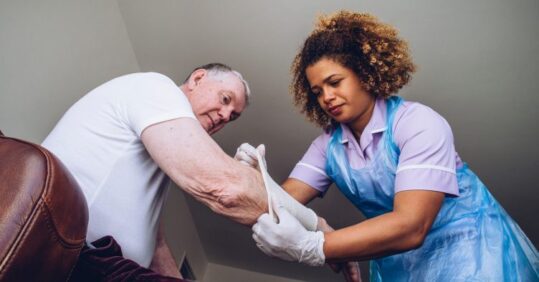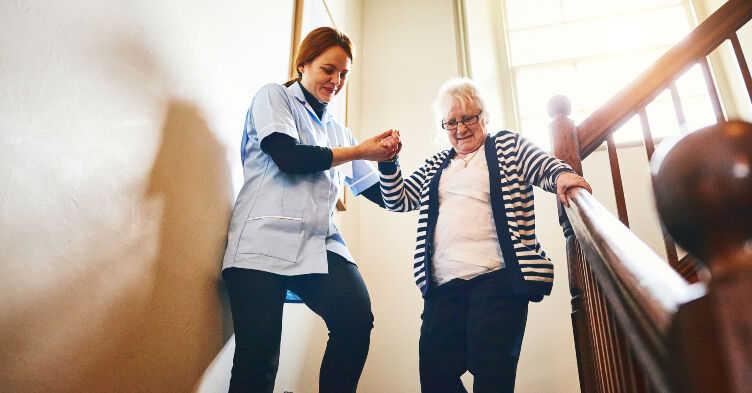Already stretched community nurses face increased workloads as thousands of Covid-19 patients are discharged from hospitals, nursing leaders have warned.
The Queen’s Nursing Institute and Royal College of Nursing have raised fears these added pressures could last for months, particularly if it emerges the disease has a long-lasting impact on health.
Dr Crystal Oldman, the QNI’s chief executive, told Nursing in Practice extra training for community nurses could be necessary.
‘There have always been people who come out of intensive care into the community, but perhaps not in the numbers that are expected now. This will be in the thousands,’ Dr Oldman said.
‘There’s much concern about how we increase the capacity, and the capabilities of the education required, of an already stretched workforce,’ she added.
Julie Green, RCN district and community nursing forum chair and professor of district nursing at Keele University, said deconditioned post-Covid-19 patients, who have lost their functional abilities in hospital, could become ‘our long-term conditions patients for the future’.
She continued: ‘They’re coming home having been acutely unwell and often ventilated. We may have a deconditioned population who never return to good health.
‘Even if there is not a second wave, this is not a short-term problem. There is a going to have a substantial long-term impact.’
A district nurse working in Dorset, who wished to remain anonymous, said that rehabilitating post-Covid-19 patients has already added to workload in her team.
She continued: ‘Team morale is low, while the workload is higher. Patients coming out of intensive care need help from district nurses and I see this happening for months to come.’
The University of Leicester launched a study this month on long-term patient recovery from Covid-19 because it is believe the virus could have a long-lasting impact on health.
In England, as of 5 July, 2,088 hospital beds are occupied by Covid-19 patients – down from a peak of 15,702 on 10 April.
Community nurses, including district nursing teams and other rehabilitation specialists, are expected to deliver care for many of these discharged patients over weeks, months and potentially longer.
Care may include managing fatigue, delivering monitoring respiratory interventions, and wound and pressure care to help regain lost muscle mass and physical functioning.
Yet district nurse numbers have plummeted in the past decade, from 7,705 in March 2010 to 4,415 in March 2020.
The QNI has said it will work to understand the challenges faced by community nursing, led by Professor Alison Leary, director of its International Community Nursing Observatory (ICNO).
The work – planned before the Covid-19 pandemic – is part of the ICNO’s aim to analyse data and trends in the community nursing workforce in greater depth, and will take place over the coming months.
Professor Leary said: ‘[This work] is important as we need to plan for the future workforce and help retain the one we have. It’s also important that people get safe and good quality care.’
Dr Oldman said: ‘This will help with workforce planning and identify the number of district nurses who need to be trained every year.
‘District Nurses are the key professionals in coordinating and delivering complex care at home,’ she added.
District nurses have warned that the Covid-19 pandemic could further worsen staffing issues due to increased workload and pressure.
An ICNO report released in November 2019 – before the Covid-19 pandemic – showed hundreds of district nurses are planning to quit amid ongoing issues over staff recruitment and retention.






